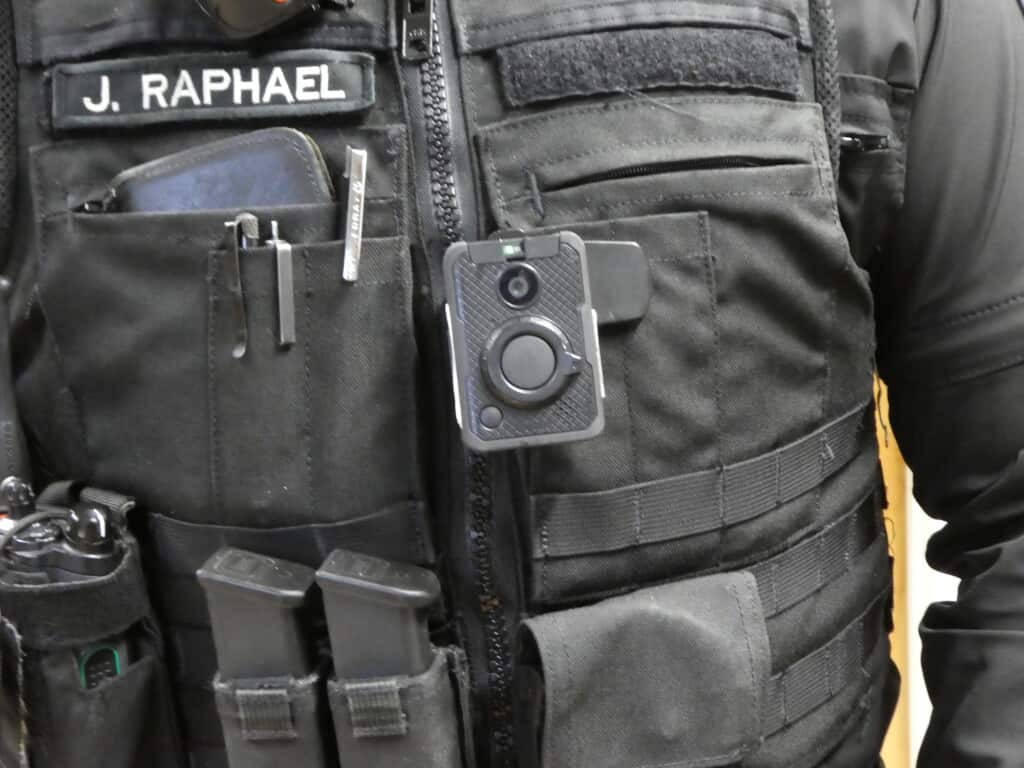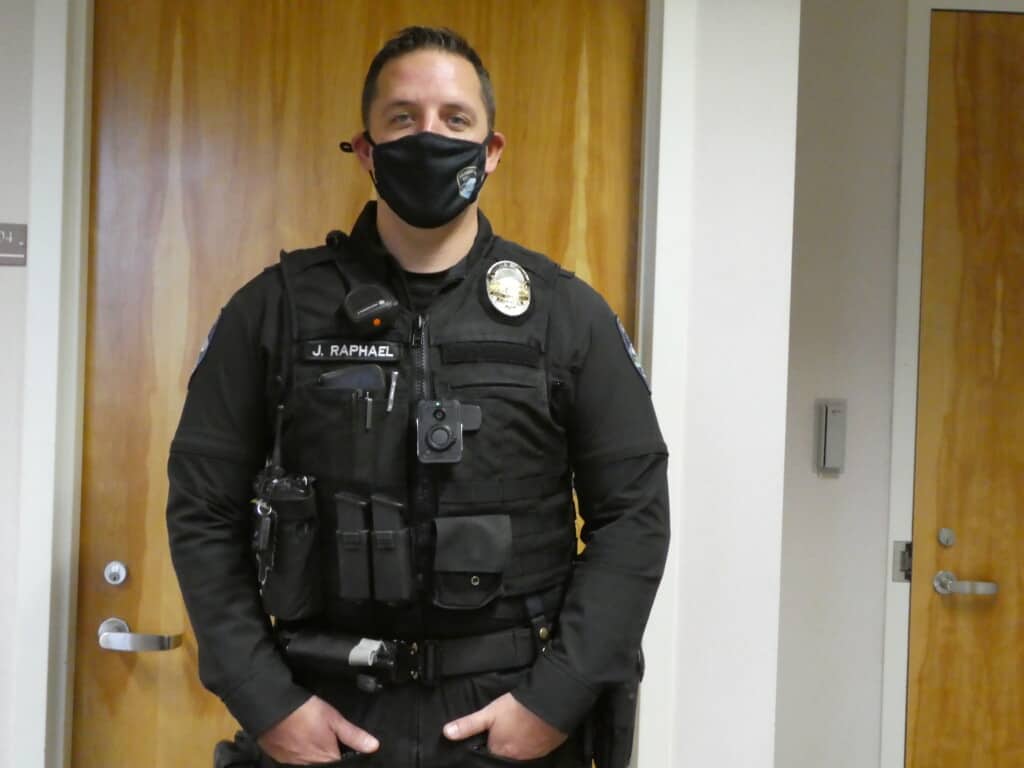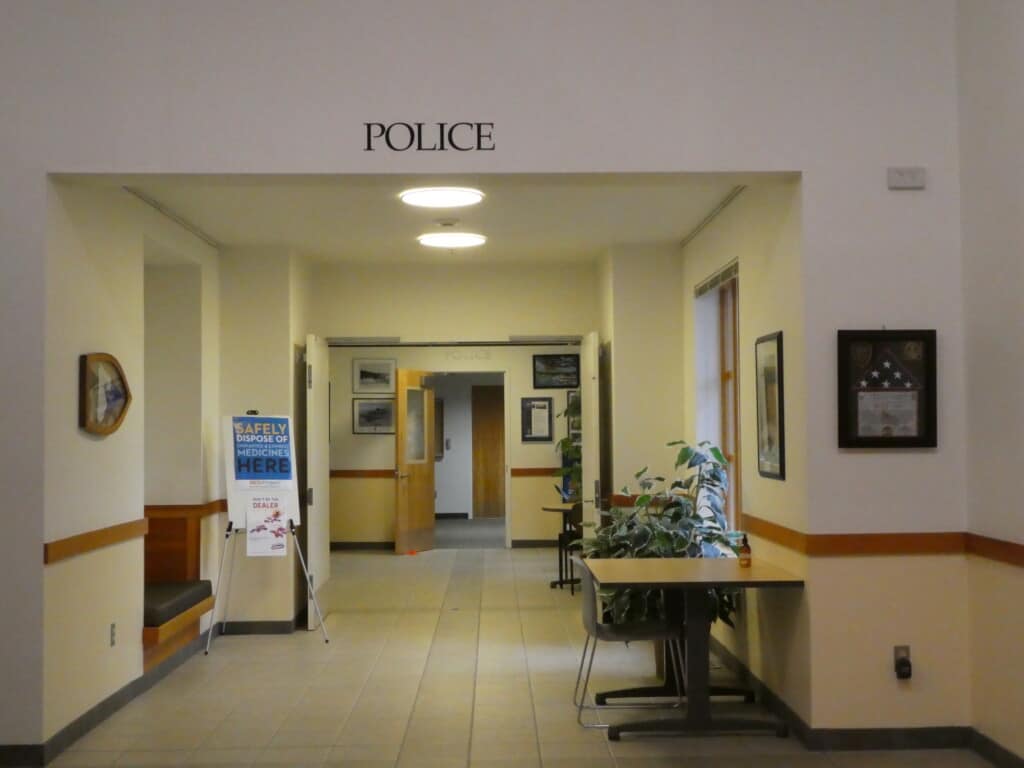Police & Fire
Police department overcomes hurdles to employing body cameras
After years of obstacles, Gig Harbor police officers are now wearing body cameras.
According to Chief Kelly Busey, back in 2018 the city participated in a pilot program and purchased the cameras. But the program was curtailed suddenly when it became apparent that use of body cameras might result in overly broad public records requests. To help prevent that, the state legislature passed a law protecting law enforcement departments from such onerous requests.

Since June, Gig Harbor police officers have worn body cameras. Charlee Glock-Jackson / Gig Harbor Now
“Most officers want the cameras” Busey said, “We had to delay the launch while we renegotiated some particulars with the police union, but those policy issues have been resolved.”
Still, it was another delay. By the time all of the details were finally worked out, the equipment had sat on the shelf for more than a year, the technology had changed, batteries were dead and there were other problems.
Fortunately, the camera manufacturer, Getac, extended some of the warranties and replaced many of the obsolete parts.
“They even sent a technician to help us with training,” Busey said.

Officer Jasen Raphael has been with GHPD for three years. He said he and his fellow officers like their new body cameras. Charlee Glock-Jackson / Gig Harbor Now
Finally this past June the cameras and ancillary equipment were ready, officers started using them and everything is working properly.
The city’s total cost for the body cameras, dash cameras and rear seat cameras came to around $175,000.
“It’s a great investment,” Busey said. “We haven’t had a substantive complaint against our department in seven years, but if something does happen, the cameras can help tell the true story.”
Department looking to fill last two vacant spots
The police department is budgeted for 21 officers. Right now there are 19, and Busey hopes to fill those last two positions soon.
Most of GHPD’s hires over the past several years have been lateral transfers — experienced officers coming from another city. Even though they have experience, the screening process is similar to that of entry-level candidates. The difference is that new recruits must attend the police academy as part of their training. The academy is a 5 1/2-month process, so it usually takes around 13 months for a new recruit to actually “get on the street,” Busey said. It’s around three months for lateral transfers

Gig Harbor’s police department currently has 19 officers. Chief Kelly Busey hopes to hire two more officers soon, to bring the department up to full staff. Charlee Glock-Jackson / Gig Harbor Now
All officers, whether entry-level or experienced, undergo a rigorous screening process that includes an extensive background check, a polygraph test and an emotional screening. GHPD is the only department in the state that does the latter, although, according to Busey, a few other jurisdictions may soon add it to their hiring process. Even with experienced officers, the background check includes a visit by Busey to the candidate’s current place of employment to interview co-workers and other individuals who can attest to the prospect’s character and skills.
Legislative issues
Busey is paying close attention to what’s on the agenda in the upcoming legislative session that begins in January.
“Last year the Legislature passed some sweeping police-reform policies that have had an enormous effect on what we can and can’t do,” Busey said. “Some of it was hastily done and not well thought out. So we’re really hoping to have some clarification on some things and fixing some of the other things that were mistakes.”
He noted that the department still responds to every call that comes in, but “what we can do when we get there has changed,” he said. For example, there’s a question about officers being able to use less lethal measures such as a beanbag round to stun a suicidal person. “And it’s currently much too easy to decertify an officer,” he added.
Petty crime
As a result of COVID restrictions at the jail, retail theft is “off the charts” locally because, even if the perpetrators are caught, they won’t be sent to jail because of COVID restrictions. This is frustrating to business owners, the police department and citizens alike, Busey said.

